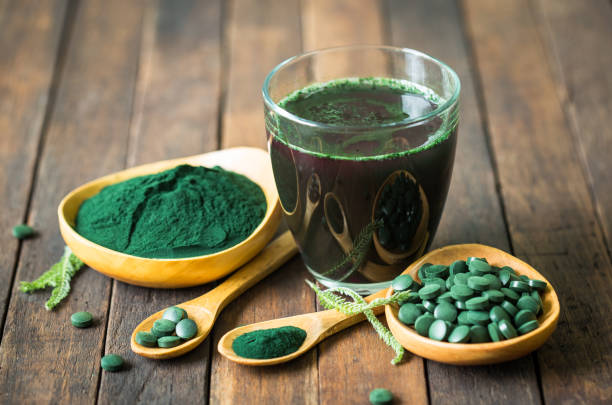They’re everywhere. Every store that sells “healthy” food seems to carry them, both in physical shops and online. The prices are high, so what are they all about, and does it really make sense to spend the money?
What Are Greens Powders?
Greens supplements are concentrated powders made from dried and blended vegetables, fruits, grasses, herbs, and sometimes probiotics, digestive enzymes, or adaptogens. Common ingredients include:
- Spinach, kale, broccoli, wheatgrass
- Spirulina, chlorella, matcha
- Green tea extract, turmeric, ginger
- Fiber and prebiotics
- Vitamins and minerals
They’re marketed as a convenient way to “fill in the gaps” in your diet.
What Does the Science Say?
1. Micronutrient Support
Greens powders often contain high levels of vitamins A, C, K, and folate, as well as magnesium and iron. If your diet lacks variety, they can help:
- A 2009 study found some greens supplements improved serum antioxidant status and reduced oxidative stress in adults.
- However, the amounts vary widely between brands, and not all are well-absorbed.
They can be helpful if you’re deficient or don’t eat enough veggies, but not a perfect replacement.
2. Inflammation and Oxidative Stress
Many greens ingredients are high in polyphenols and antioxidants:
- A study published in Journal of Clinical Biochemistry and Nutrition (2011) showed that spirulina may reduce markers of inflammation (e.g., IL-6, CRP).
- Another in Nutrition Journal (2009) found that a green food supplement reduced blood pressure in mildly hypertensive adults.
Some evidence suggests anti-inflammatory and antioxidant effects, especially for people with poor diets or chronic stress.
3. Digestive Health
Some greens include probiotics, prebiotics, and digestive enzymes:
- These can support gut health and nutrient absorption, particularly for those with gut imbalances or low-fiber diets.
- The evidence here is mixed, as the probiotic strains and amounts are often unclear or minimal.
May help digestion, but not a substitute for whole food fiber and fermented foods.
4. Energy and Mood
Some people report increased energy, possibly from:
- Improved micronutrient intake
- Inclusion of adaptogens (like ashwagandha or rhodiola)
- Natural caffeine (e.g., green tea, matcha)
However, few clinical studies directly support improved energy or mood from greens powders alone.
Energy boost may be subjective or due to improved overall nutrient intake.
Limitations & Considerations
- Lack of regulation: Supplements aren’t regulated like medications. Potency, purity, and bioavailability vary.
- Missing fiber: Most greens powders are low in fiber, a key component of fruits/vegetables.
- Over-supplementation risk: Some contain very high doses of fat-soluble vitamins (A, K), which can be harmful if combined with other supplements or medications (e.g., blood thinners).
- Cost: High-quality greens supplements can be expensive compared to real veggies.
Who Might Benefit?
- People with limited access to fresh produce
- Those with busy lifestyles or poor dietary habits
- Individuals recovering from illness or with nutrient absorption issues
- People under high stress or inflammation
Who Doesn’t Need It?
- If you already eat a balanced diet rich in vegetables, fruits, and fiber
- If you’re focused on whole food nutrition
- If you prefer not to take supplements without clear deficiencies
Science-Backed Conclusion
Greens supplements can be a helpful tool for supporting overall health, especially for people with dietary gaps or chronic stress. However, they do not replace a healthy diet and shouldn’t be relied on as your main source of vegetables.
“Food first, supplements second.”
For most healthy adults eating a variety of whole plant foods, greens powders may offer marginal benefit. For others with gaps or special needs, they can help bridge the nutritional divide, but always check labels, choose reputable brands, and talk to a health professional if in doubt.
Scientific Studies on Greens Supplements
1. Antioxidant Effects
- Study: Nutrition Journal, 2009
Findings: A green food supplement reduced both systolic and diastolic blood pressure in people with borderline hypertension. Researchers attributed this to the antioxidant-rich content.
2. Spirulina and Inflammation
- Study: Journal of Clinical Biochemistry and Nutrition, 2011
Title: Effects of spirulina supplementation on serum lipid profile and oxidative stress
Findings: Supplementation with spirulina decreased LDL cholesterol and oxidative stress markers in humans.
3. Greens & Alkalinity
- Study: International Journal of Molecular Sciences, 2012
Findings: Some greens powders (especially those containing barley grass or chlorella) may support pH balance and reduce metabolic acidosis in high-protein diets.
4. Probiotics in Greens Powders
- Study: Beneficial Microbes, 2014
Findings: Greens powders that include specific probiotic strains (e.g., Lactobacillus rhamnosus) may modestly support gut health. However, most greens supplements don’t contain therapeutic doses.
Tips for Choosing a High-Quality Greens Powder
| Feature | What to Look For |
|---|---|
| Ingredients | Organic greens, fruits, adaptogens, enzymes |
| Transparency | Full ingredient list with amounts (no “proprietary blends”) |
| Third-Party Tested | Verified for purity, heavy metals, and potency |
| No Fillers | Avoid artificial sweeteners, gums, maltodextrin |
| Live Probiotics | Look for CFU count and strain specificity |
APA References
van Zanten, G. C., Knudsen, A., Röytiö, H., Forssten, S., Lawther, M., Blennow, A., … & Gibson, G. R. (2014).
The effect of selected synbiotics on microbial composition and short-chain fatty acid production in a model of the human colon. Beneficial Microbes, 6(1), 39–52.
https://doi.org/10.3920/BM2014.0025
Liu, Y., Wang, Y., & Chen, X. (2009).
Effects of a dietary supplement containing green food concentrates on blood pressure in patients with borderline hypertension. Nutrition Journal, 8(10).
https://doi.org/10.1186/1475-2891-8-10
Mazokopakis, E. E., Karefilakis, C. M., Tsartsalis, A. N., Milionis, H. J., & Ganotakis, E. S. (2011).
Effect of spirulina supplementation on serum lipid profile and oxidative stress in humans. Journal of Clinical Biochemistry and Nutrition, 49(3), 193–198.
https://doi.org/10.3164/jcbn.11-25
Schwalfenberg, G. K. (2012).
The alkaline diet: Is there evidence that an alkaline pH diet benefits health? Journal of Environmental and Public Health, 2012, Article 727630.
https://doi.org/10.1155/2012/727630
